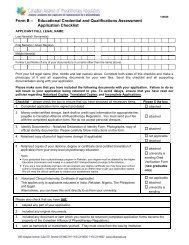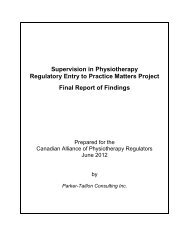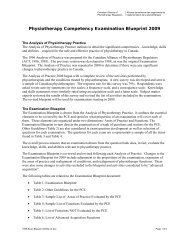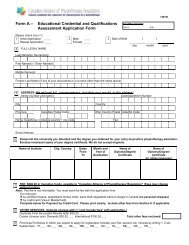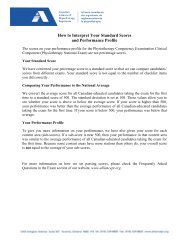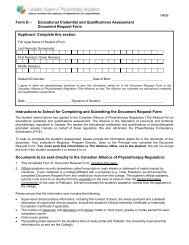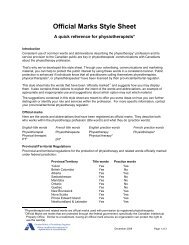Frequently Asked Questions - Canadian Alliance of Physiotherapy ...
Frequently Asked Questions - Canadian Alliance of Physiotherapy ...
Frequently Asked Questions - Canadian Alliance of Physiotherapy ...
Create successful ePaper yourself
Turn your PDF publications into a flip-book with our unique Google optimized e-Paper software.
<strong>Physiotherapy</strong> Competency Examination — FAQs<br />
What Is the Purpose <strong>of</strong> the Exam?<br />
The <strong>Physiotherapy</strong> Competency Examination (PCE) helps provincial and territorial physiotherapy<br />
regulators find out if you are ready for independent practice.<br />
What does the exam do?<br />
The <strong>Physiotherapy</strong> Competency Examination tests whether qualified exam candidates have<br />
demonstrated a minimum standard <strong>of</strong> practice. The PCE ensures that members <strong>of</strong> the public will be<br />
safe when they interact with physiotherapists. It fairly and accurately evaluates the competencies<br />
you need to have to practice physiotherapy. Most physiotherapy regulators in Canada include<br />
passing the PCE as part <strong>of</strong> their entry-to-practice process.<br />
The PCE tests the essential competencies <strong>of</strong> physiotherapy practice – the essential knowledge, skills<br />
and abilities. It tests history-taking, physical examination, data interpretation, clinical problem<br />
solving, treatment techniques, ethics, safety, interviewing and communication. The exam covers the<br />
core clinical practice areas: neuromusculoskeletal, neurological, cardiopulmonary-vascular and<br />
multisystem. The PCE is a reliable and valid assessment tool that fairly evaluates candidates on<br />
many competencies.<br />
Passing the PCE means that you have demonstrated the minimum standard <strong>of</strong> knowledge, skills and<br />
abilities. Failing the PCE indicates that you have not yet demonstrated the minimum standard <strong>of</strong><br />
knowledge, skills and abilities.<br />
What does the exam do for physiotherapy regulators?<br />
The provincial and territorial regulators must protect the public. They can do this best by using a<br />
consistent and legally defensible standard for all candidates who want to register to practise<br />
physiotherapy, no matter where they have completed their physiotherapy program.<br />
Why are there two components?<br />
The Written and Clinical Components provide us with different information about your knowledge,<br />
skills and abilities.<br />
The Written Component tests a broad base <strong>of</strong> physiotherapy knowledge in the practice areas <strong>of</strong><br />
neuromusculoskeletal, neurological, cardiopulmonary-vascular and multisystem. The Written<br />
Component tests your ability to use and integrate clinical knowledge and to solve clinical problems<br />
using clinical scenarios. You must achieve a minimum overall score to pass the Written Component.<br />
The Clinical Component tests safe, effective use <strong>of</strong> the principles and processes <strong>of</strong> physiotherapy<br />
practice. The knowledge, skills and abilities assessed by the Clinical Component include<br />
communication skills and pr<strong>of</strong>essional behaviour.<br />
5



